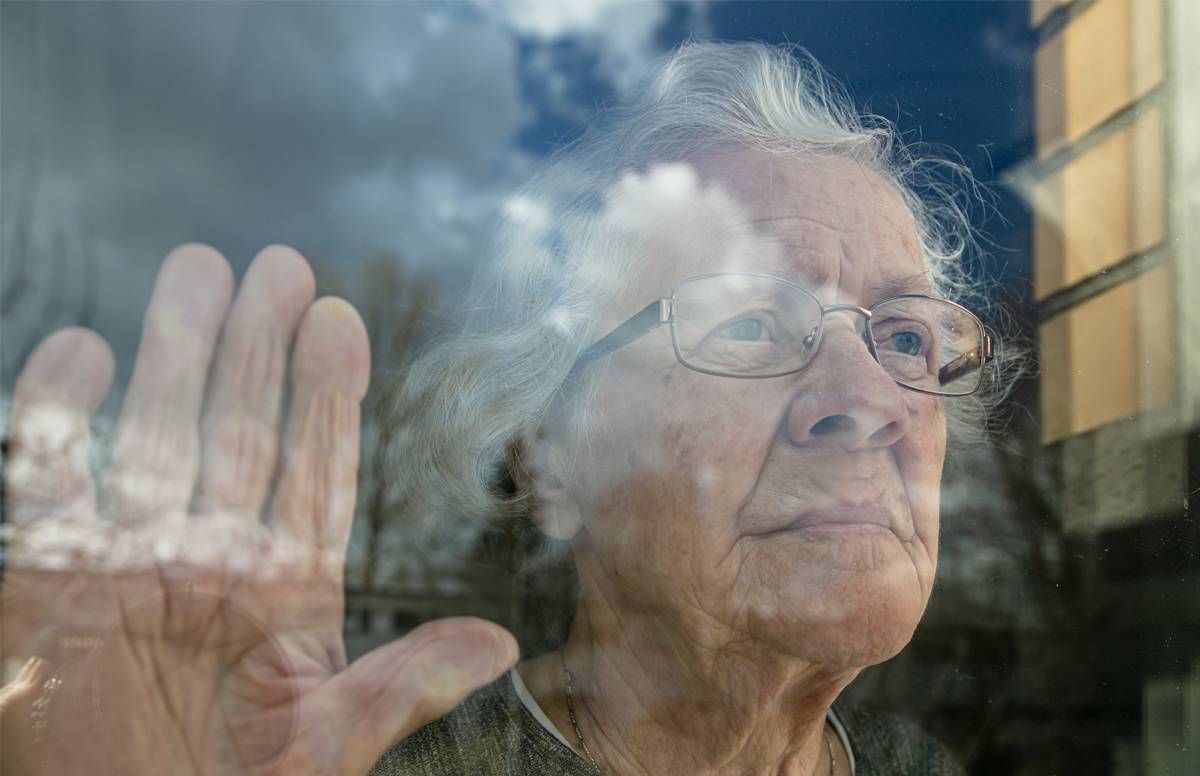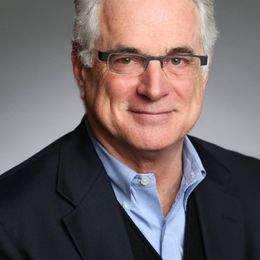A Pandemic Lockdown Just for Older People? No!
What's wrong with targeting Americans who are 65+
An idea is gaining traction among some economists and scholars to deal with the pandemic in America: Isolate and lockdown older Americans, possibly until there is a vaccine. Everyone else gets to go back to work and regain something resembling normalcy.

Some proponents call it "shielding" the eldest, usually defined as those 65 and older. Others prefer terms like "targeting" or "cocooning." One Georgia freeway sign said: "Isolate the Elderly." I'd label this pandemic proposal wrong, deeply wrong.
Simply put, Orwellian age-based segregation will undermine the economy's vitality, betray society's values and won't contain the virus.
"Even if we made the value decision that we're going to isolate people who are over sixty, sixty-five, seventy — you pick — out of the economy, out of the labor force for their own sake and all the rest of our sakes, it won't work," says Ruth Finkelstein, executive director of the Brookdale Center for Healthy Aging at Hunter College and a Next Avenue Influencer in Aging.
A Look at the 'Targeting' Idea to Fight the Pandemic
The targeting idea got widespread attention after four MIT economists wrote a paper recommending it ("Optimal Targeted Lockdowns in a Multi-Group SIR Model") and publishing a related article in Time. SIR, incidentally, is not said with love: it stands for Susceptible, Infected and Recovered; a basic epidemiological model.
The MIT economists — Daron Acemoglu, Victor Chernozhukov, Iván Werning and Michael D. Whinston — calculated what they determined to be the costs and benefits of different strategies for limiting the spread of COVID-19 while encouraging growth in gross domestic product (GDP). They argue the most efficient policy is for the government to focus its scarce resources on lockdown policies targeted at those 65 and older (roughly 50 million people), since they're more vulnerable to dying from COVID-19.
Our Commitment to Covering the Coronavirus
We are committed to reliable reporting on the risks of the coronavirus and steps you can take to benefit you, your loved ones and others in your community. Read Next Avenue's Coronavirus Coverage.
"Because those over 65 years of age have around 60 times the mortality rate of those ages 20 to 49, lockdowns on the elderly as a protective measure can be very effective in reducing deaths," they wrote.
Their paper didn't elaborate on how exactly the isolation strategy would work. But they believe in taking steps to protect the vulnerable in nursing homes and other residential care facilities. And they advocate for the creation of an Elder Care Corps to provide a few hours of support a week for older Americans who live alone or with others their age.
Problems With Isolating Older Adults Until a Vaccine Arrives
I don't find the age-segregation solution convincing.
A major problem with targeting is that it's based on a basic fallacy about aging: that older people are a homogeneous cohort. They aren't.
"There is extraordinary heterogeneity across the older population," wrote Nora Super, senior director of the Milken Center for the Future of Aging and James Appleby, CEO of the Gerontological Society of America. "As we age, we become more different. Not more alike."
A major problem with targeting is that it's based on a basic fallacy about aging: that older people are a homogeneous cohort
Roughly 39% of men age 65 to 69 and 30% of women that age are in the workforce, not at home and retired, according to the Urban Institute. Boomers — ages 55 to 73 — account for more than 40% of small business owners. They also spend half of all money Americans shell out for groceries, cosmetics, cleaning products and the like.
In other words, isolate older Americans and "the economy hits the skids," warns Joseph Coughlin, director of the Massachusetts Institute of Technology AgeLab, author of The Longevity Economy: Inside the World's Fastest Growing, Most Misunderstood Market and a Next Avenue Influencer in Aging.
Adds Eugene Steuerle, an economist at the Urban Institute: "Treating people sixty-five-plus as monolithic is questionable."
The Effect of Isolation on Older Adults' Health
Isolation of older adults can lead to worsened health for them, too.
Aida Suárez-González, of the UCL Institute of Neurology in London, just published a paper noting disturbing findings of people with dementia in an April 2020 Italian Cognitive Disorders Centre survey of 139 patients.
In their first month of lockdown, 54% of respondents reported worsening or onset of agitation, apathy and depression. And, she noted, an Alzheimer's Society survey in the UK showed that 79% of the 128 care homes surveyed said lack of social contact was believed to be causing a deterioration in the health and wellbeing of their residents with dementia.
Recently, the death certificates of three Minnesotans in their 90s listed "social isolation" as a cause of death or contributing factor, according to Twincities.com.
The American Psychological Association has said we need to "encourage social distancing, not social isolation."
Making Sacrifices, Within Reason
Another troubling issue: What kind of society lets younger generations keep their freedoms while denying choice to an older generation who is, on average, living healthier and longer lives than in the past?
That isn't to say the older generation isn't willing to make sacrifices in the pandemic.
"If it were a question of being quarantined for a bit longer so that they [younger people] could go about their business, I would do it," says Alicia Munnell, 77, an economist and executive director of the Center for Retirement Research at Boston College, who's been sheltering in place with her husband, son and his family in Vermont. "I wouldn't like it. But I would do it."
So would I, and I bet most of my peers would too. (I'm 66.)
In fact, an April 2020 survey of Americans 70 and older from NORC at the University of Chicago found that 83% of them said they're prepared to self-isolate for several months if necessary, to stay healthy and safe and protect others.
Who wouldn't shelter in place for slightly longer if it meant younger people could launch their careers and start families? But for an uncertain length of time that could easily extend for years during the hunt for safe, mass vaccinations? Not a chance.
That's why I think the targeting idea is a non-starter politically in the U.S.
Older Adults and Younger Adults
Policy prescriptions based on age and vulnerability to COVID-19 are reductionist in another way.
While at least 40% of coronavirus deaths have been in nursing homes, only about 4% of those 65 and older live in nursing homes and other residential care settings. And the COVID-19 death rate of 63 per 100,000 for those ages 65 to 74 is much less than 481 per 100,000 for people 85 and older.
"The degree of enhanced risk bound only on age is severely overstated in the data."
Even more important, many young Americans live with the same underlying health conditions that put them at risk to the coronavirus as older ones, including diabetes, asthma and obesity. The recent spike in coronavirus cases in Florida, Texas and elsewhere has largely been driven by young adults partying and gathering in large crowds. Their fatality rate from the virus will be lower than older adults, but it won't be zero, either. (Nor is it clear if there will be long-term effects on their health.)
The Connection to the Early Days of HIV/AIDS
Finkelstein drew a parallel to what she saw when she was a grad student deeply involved in the fight against HIV/AIDS. Back then, the focus was on what were called the four "H's": homosexuals, Haitians, heroin users and hemophiliacs. She'd point out that the early HIV/AIDS studies were mainly of white, college educated gay men and she kept saying: 'No, people of color are at risk, but you aren't including them.'
"I started to go absolutely bananas," Finkelstein says. "The virus was disproportionately affecting people of color." Of course, we now know that people of color are at far greater risk to HIV/AIDS than whites.
"Now, carry this forward" to the coronavirus, Finkelstein says. She believes not enough attention is being paid to its racial disparities. The focus on age alone underestimates the impact of disparities in health and vulnerability to COVID-19 among people of color.
"The degree of enhanced risk bound only on age is severely overstated in the data. We're so preoccupied to find the vector, the villain, the victim, who to blame?" says Finkelstein. "We need entrepreneurs, we need startups, we need businesses to open. But we won't do it by isolating any one group."
Vice President Mike Pence recently said: "It's a good time to steer clear of senior citizens."
What Would Work Better
But the truth is, we're going to be living with this virus for years, at least until mass vaccination becomes practical, and that's before considering prospects for future pandemics in the global economy. (Some public health officials and scientists fear a coronavirus vaccine might not be fully effective for older Americans with weakened immune systems.)
What would work to attack the coronavirus is to embrace investing in what Finkelstein calls "universal precautions." That could include creating widely installed air filtration systems at work; safer public transit options and the ability for Americans to do as many jobs as possible remotely.
When telework isn't an option — think meatpacking and groceries and hospitals — employers will need to follow stringent safety solutions. Deep-seated inequities in access to good health care will need to be erased, too.
To be sure, investments like these aren't cheap or easy. But they build off of, and help create, a strong societal foundation.
As 79 year old Dr. Anthony Fauci, director of the National Institute for Allergy and Infectious Diseases, recently remarked: "We are all in it together. And the only way we're going to end it is by ending it together."
Young and old alike — together.


